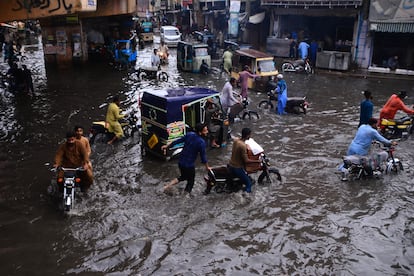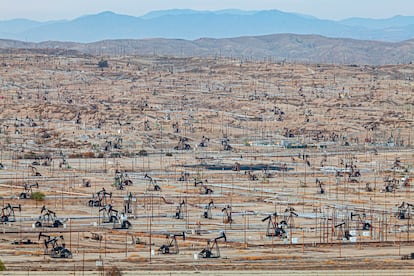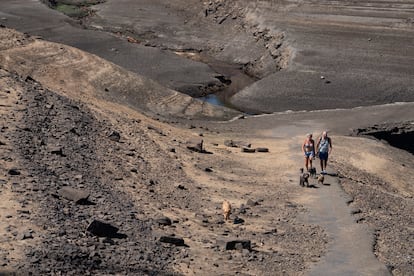How fossil fuels kill: Study warns of the impact of climate crisis on global health
The Lancet Countdown says rising temperatures increase cardiovascular and respiratory ailments, heat-related deaths, mental problems and food insecurity


The climate crisis derived from the burning of fossil fuels is already a major global health problem. As warming makes extreme weather events such as heat waves, floods and major droughts more frequent and intense, the damage to human health keeps growing. Since 2016, a group of international researchers has been analyzing these impacts in a study by The Lancet Countdown, which looks at 43 indicators to track the relationship between health and climate change.
The main conclusion of this seventh report is resounding: it shows the worst findings to date. “Climate change is exacerbating food insecurity, health impacts from extreme heat, the risk of infectious disease outbreaks, and life-threatening extreme weather events,” said the report in one of its key findings. “The climate crisis is killing us,” summarized António Guterres, Secretary General of the United Nations, after the publication of the study.
In the 2022 report, researchers underscored the link between climate change and fossil fuels: oil, natural gas and coal that are responsible for around 80% of the man-made greenhouse gases that end up in the atmosphere, overheating the planet. “A persistent fossil fuel addiction is amplifying the health impacts of climate change, and compounding the concurrent energy, cost-of-living, food, and Covid-19 crises we face,” the report concluded.
Average global temperatures have already reached 1.1 degrees Celsius above pre-industrial levels, and the forecast is that they will continue to increase in the coming decades due to the gases that have already been emitted. The goal now is to reduce these emissions so that the increase in average global temperatures will remain within certain safety limits: no more than 2ºC, and, if possible, 1.5ºC.
Health impacts
Health impacts from exposure to extreme heat are increasing and affecting mental health, as well as undermining the ability to work and exercise, warns the study, in which 99 experts from 51 institutions have participated. That exposure exacerbates underlying conditions such as cardiovascular and respiratory diseases, and causes heat stroke, negative pregnancy outcomes, altered sleep patterns, mental health problems and increased deaths.
Although this crisis affects everyone, it does not affect everyone to the same degree. The most vulnerable population groups are those who are suffering the most. The report highlights that heat-related deaths in those over 65 years of age increased by 68% in the period between 2017 and 2021 compared to 2000-2004.

This same asymmetry between population groups also occurs between countries. A good example is the impact on food security. Increasing temperatures and extreme weather events directly threaten crop yields by shortening the growing season of crops by 9.3 days for maize, 1.7 days for rice and six days for wheat. This in turn has led to an increase in the number of people in a situation of food insecurity. Droughts also contributed to this: 29% more of the global land surface was affected by extreme drought each year in the period between 2012 and 2021, compared to the 1951-1960 period.
The report not only examines what is already happening, but also warns about what may come. Climate change is already having a negative impact on food security, with worrying implications for malnutrition. Further increases in temperature, in the frequency and intensity of extreme weather events, and in carbon dioxide concentrations will put further pressure on the availability and access to nutritious food, especially for the most vulnerable sectors, noted Elizabeth Robinson, director of the Grantham Research Institute on Climate Change and the Environment of the London School of Economics and one of the authors of the report.

The climate crisis also contributes to the spread of infectious diseases. For example, the likelihood of dengue transmission increased by 32.1% in the highlands of the Americas, and 14.9% in Africa between 2012 and 2021 (compared to the period 1951-1960). Along with the Covid pandemic, the increase in infectious diseases due to climate change has caused diagnostic errors, pressure on health systems and difficulties in managing simultaneous disease outbreaks, the study adds.
The authors also analyzed the fossil fuel sector and the public support it continues to receive, criticizing the fact that “despite these health harms, governments and companies continue prioritizing fossil fuels to the detriment of peoples’ health.” The study notes that despite commitments, the carbon intensity of the global energy system decreased by less than 1% since 1992, the year the United Nations Framework Convention on Climate Change was adopted. In that treaty, countries committed to fighting climate change, yet emissions have grown almost continuously since then.
Slow pace
It is true that an incipient transition is underway with the implementation of renewables and electric mobility, which do not emit carbon dioxide, but the report warns that at the current rate of change, the complete decarbonization of the energy system would take 150 years, which means breaching the target of 1.5 degrees. To achieve this goal, almost total decarbonization is needed from the second half of the century. “Yet governments around the world continue to subsidize fossil fuels to a sum of hundreds of billions of dollars annually.” Additionally, “fossil fuel giants pursue plans which would lead to emissions vastly exceeding levels compatible with the Paris Agreement goals. If these strategies are pursued, they would lock the world into a fatally warmer future with catastrophic health impacts.”

UN Secretary General Guterres on Wednesday advocated for “massive investments” in renewable energy and in adaptation measures to protect populations against the negative impacts of global warming. The Lancet Countdown report also noted that improvements in air quality would help “prevent the 1.2 million deaths resulting from exposure to fossil fuel-derived ambient particulate matter.” It also looked at the impact of insufficient urban green space and diet imbalances, noting that low-carbon, plant-rich diets could help prevent deaths from low intake of fruit and vegetables, and high intake of red meat and dairy.
Tu suscripción se está usando en otro dispositivo
¿Quieres añadir otro usuario a tu suscripción?
Si continúas leyendo en este dispositivo, no se podrá leer en el otro.
FlechaTu suscripción se está usando en otro dispositivo y solo puedes acceder a EL PAÍS desde un dispositivo a la vez.
Si quieres compartir tu cuenta, cambia tu suscripción a la modalidad Premium, así podrás añadir otro usuario. Cada uno accederá con su propia cuenta de email, lo que os permitirá personalizar vuestra experiencia en EL PAÍS.
¿Tienes una suscripción de empresa? Accede aquí para contratar más cuentas.
En el caso de no saber quién está usando tu cuenta, te recomendamos cambiar tu contraseña aquí.
Si decides continuar compartiendo tu cuenta, este mensaje se mostrará en tu dispositivo y en el de la otra persona que está usando tu cuenta de forma indefinida, afectando a tu experiencia de lectura. Puedes consultar aquí los términos y condiciones de la suscripción digital.








































